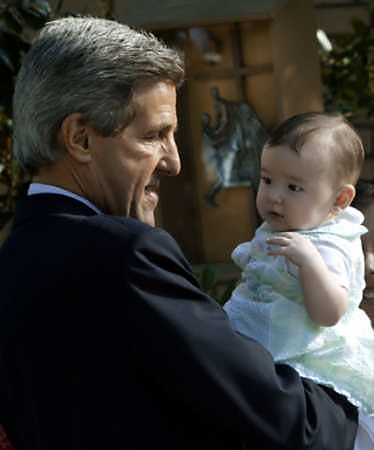
Month / November 2004
“Don’t Film Me” — the Last Cry of a Scoundrel
Joshuah Bearman: “Which is why we drove them away. The trick with Republican staffers running dirty tricks, we discovered, is to turn cameras on them. They wilt like shrinking violets. Stephen Elliott and I are out here with a documentary crew, and when the film started rolling, the GOP?s bogus Gay Pride parade came to a quick end. ‘Don?t film me,’ the ringleader said when we stuck to them. ‘I?m expressing my freedom of speech.'” (via Bondgirl)
Politics is a Sham
I’d express my malaise about tomorrow, but Jeff and Maud have ably covered this ground. I’ll only say that I’ve never felt so much disgust for politics. On the national, state and local level, we have been inundated with lies, ultimatums, and outright blackmail if we don’t abide by one party line or the other.
Tomorrow’s election is perhaps the most important election in the last sixty years. So I encourage all Return of the Reluctant readers to vote. However, to put my own personal partisanship aside, I also urge all voters to vote who they feel is right for the job. Contrary to the leaflets that clog the mailboxes, no one is holding a gun to your head to abide by some austere answer key. You can vote any combo you want. You can vote any candidate you want. Just don’t become a drone.
AMR
- Jonathan Stroud unveils his favorite fantasy novels.
- “Hot” John Sayles talks about his short story collection with the Globe.
- The Hag has new digs (and she’s now read Marquand to boot!).
- The New Yorker goes all Nancy Drew on us.
- Hemingway the boxer.
- Dave Eggers: this generation’s Jack Kerouac?
- Newsday talks with M.G. Vassanji.
Song of Solomon
It’s official. Deborah Solomon now rivals Rex Reed as the least distinguished interviewer of the past forty years and comes perilously close to Ann Coulter as the most deliberately hateful writer working today. One is tempted to unleash limitless fury against such a bilious interlocutor. But that would only involve resorting to her level.
Nevertheless, Solomon’s interview with Christine Schutt sets a new low for the Times. It smacks of an anti-intellectual hubris that, at the risk of invoking Godwin, one might associate with the 1933 Opernplatz incident, whereby brownshirts tossed “un-German” books (in Solomon’s case, books that aren’t published by a mainstream press) into a raging conflagration of pure destruction. The actual quality of Schutt’s work isn’t discussed. But the publishing circumstances and Schutt’s lifestyle choices are. It is a complete disgrace that such a fixation would be encouraged, let alone published, in a major newspaper. It suggests that the New York Times (possibly in collusion with Tanenhaus’ diminishing returns on the literary fiction front) has openly declared a war on literary culture. And, as such, it has no substantive value to any serious newspaper reader.
Not only does Solomon compare literary excellence with a washing machine, but, in inveighing against Schutt for the formulation of a story idea, she is utterly incapable (perhaps deliberately so) of comprehending how art originates, let alone understanding the distinction between art and reality. This lack of comprehension is interesting, given Solomon’s roots as an art critic for the Wall Street Journal. But even then, Solomon was hungrier than a gravid wolf. She was fired by Raymond Sokolov because she insisted on writing for several other publications on the WSJ‘s dime. But that didn’t stop her from tossing soda onto Sokolov’s lap.
Solomon has a long history of failing to get the job done. In 2001, Solomon attacked the Milwaukee Art Museum without bothering to visit the museum or its collections. And, as Charlie Finch has suggested, Utopia Parkway, Solomon’s biography of Joseph Cornell, is the rare case in which the author clearly despises her subject.
So what do you do when you’re a jaded biographer dissatisfied with your work? You lash out at your subjects. Instead of confronting a major politician about the history of his remarks, you ask him about his hair. You ask one of the greatest figures in rock and roll history if he’s dying. You take the easy route and go after the easy targets.
What does Solomon’s continued employment (and corresponding attack dog tactics) prove? It suggests that the Times is more interested in catering to devout readers of People or Maxim than actually probing its subjects. It communicates to its loyal readership that they are dumb, dumb, dumb, and that the Grey Lady (ridiculously enough) is oh so cool. It perpetuates a sad chronicle of a major newspaper that consistently undervalues literature.
And in adopting and reinforcing this stance, the Times has demonstrated that it is no different from the half-literate country bumpkins.